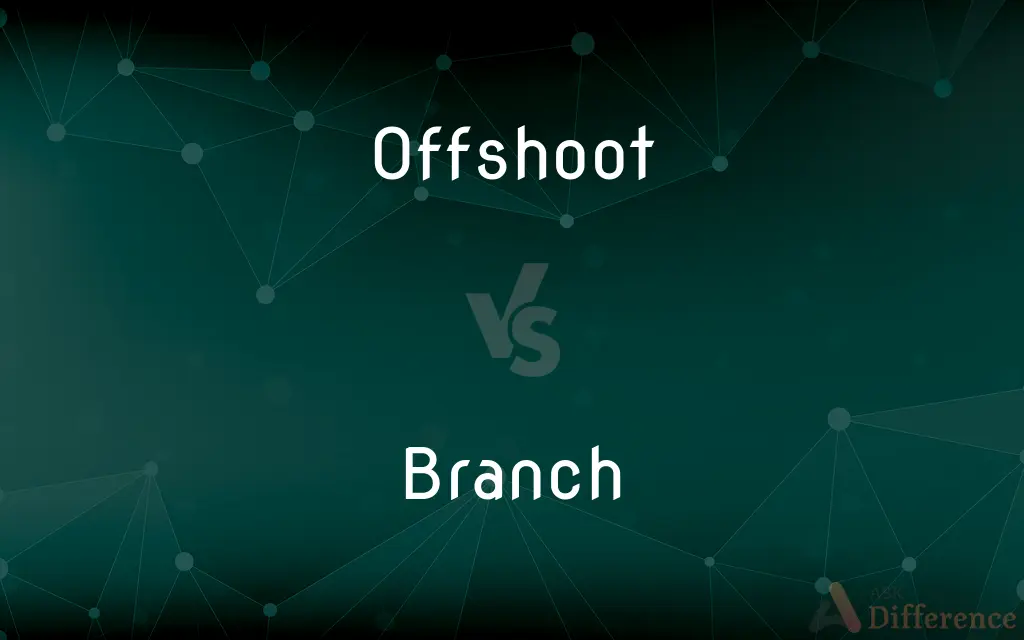Offshoot vs. Branch — What's the Difference?
By Tayyaba Rehman & Urooj Arif — Updated on April 17, 2024
An offshoot refers to a derivative or byproduct, often seen in projects or ideas, whereas a branch typically denotes a division or subdivision within a larger organization or system.

Difference Between Offshoot and Branch
Table of Contents
ADVERTISEMENT
Key Differences
An offshoot often emerges as a new development or extension from an original idea or project, emphasizing its role as a secondary, albeit distinct, entity. On the other hand, a branch is usually an integral part of a larger organization, such as a company or tree, representing a direct and functional subdivision.
While offshoots are typically smaller or less significant than the main entity and can diverge significantly from the original purpose or function, branches maintain a closer functional and hierarchical connection to their parent body, emphasizing continuity and support within the main structure.
Offshoots can also imply a temporary or experimental nature, exploring new directions or innovations. Whereas, branches suggest a more permanent, established presence, crucial for the distribution of resources or services in various locations or fields.
The creation of an offshoot is often driven by specific needs, such as addressing a new market or escaping constraints of the main entity. Conversely, branches are usually planned as part of strategic expansion or decentralization, aiming to enhance reach and operational efficiency.
In biology, an offshoot might refer to a new plant growth that can eventually develop into an independent plant, whereas a branch is part of a tree, extending its reach and contributing to its overall growth and shape.
ADVERTISEMENT
Comparison Chart
Definition
A secondary product or development from a main source
A subdivision or offshoot of a larger organization
Significance
Often smaller, less significant
Maintains a significant connection to the main body
Purpose
To explore new directions or opportunities
To expand reach and manage functions efficiently
Duration
Can be temporary or experimental
Generally permanent and planned
Example in Biology
New plant growth that can develop independently
Part of a tree, contributing to growth and shape
Compare with Definitions
Offshoot
A development that branches out from a main project.
The new software was an offshoot of earlier research.
Branch
A field or area of knowledge considered part of a broader subject.
She specializes in the branch of molecular biology.
Offshoot
Something produced by branching off from the main body.
They started an offshoot brand focusing on eco-friendly products.
Branch
A division of a main body of individuals or things.
The northern branch of the family held a reunion.
Offshoot
A lateral or side shoot from a main stem of a plant.
Gardeners often propagate new plants from offshoots.
Branch
A part of a larger company or organization.
The bank opened a new branch downtown.
Offshoot
A subsidiary group derived from a main group.
The club's offshoot focuses on community service.
Branch
A secondary woody stem or limb growing from the trunk or main stem of a tree or shrub.
He climbed up the tree by grabbing onto a branch.
Offshoot
An outcome that diverges from the original plan.
The discussion took an unexpected offshoot into unrelated topics.
Branch
An extension of a main line of development.
Their business strategy included opening several new branches.
Offshoot
Something that branches out or derives its existence or origin from a particular source.
Branch
A branch (UK: or UK: , US: ) or tree branch (sometimes referred to in botany as a ramus) is a woody structural member connected to but not part of the central trunk of a tree (or sometimes a shrub). Large branches are known as boughs and small branches are known as twigs.
Offshoot
A branch, descendant, or member of a family or social group.
Branch
A part of a tree which grows out from the trunk or from a bough
Sophie was in the branches of a tree eating an apple
Offshoot
(Botany) A lateral shoot from the main stem of a plant.
Branch
(of a road or path) divide into one or more subdivisions
Follow this track south until it branches into two
Offshoot
Something which shoots off or separates from a main stem or branch of a plant.
The offshoots of a tree
Branch
(of a tree or plant) bear or send out branches
This rose has a tendency to branch and spread at the top
The branching heads of large yellow daisies
Offshoot
Somethng which develops from something else.
An offshoot of a criminal organization
Branch
A secondary woody stem or limb growing from the trunk or main stem of a tree or shrub or from another secondary limb.
Offshoot
That which shoots off or separates from a main stem, channel, family, race, etc.; as, the offshoots of a tree.
Branch
A lateral division or subdivision of certain other plant parts, such as a root or flower cluster.
Offshoot
A natural consequence of development
Branch
A secondary outgrowth or subdivision of a main axis, such as the tine of a deer's antlers.
Branch
(Anatomy) An offshoot or a division of the main portion of a structure, especially that of a nerve, blood vessel, or lymphatic vessel; a ramus.
Branch
An area of specialized skill or knowledge, especially academic or vocational, that is related to but separate from other areas
The judicial branch of government.
The branch of medicine called neurology.
Branch
A division of a business or other organization.
Branch
A division of a family, categorized by descent from a particular ancestor.
Branch
(Linguistics) A subdivision of a family of languages, such as the Germanic branch of Indo-European.
Branch
A tributary of a river.
Branch
Chiefly Southern US See creek. See Note at run.
Branch
A divergent section of a river, especially near the mouth.
Branch
(Mathematics) A part of a curve that is separated, as by discontinuities or extreme points.
Branch
A sequence of program instructions to which the normal sequence of instructions relinquishes control, depending on the value of certain variables.
Branch
The instructions executed as the result of such a passing of control.
Branch
(Chemistry) A bifurcation in a linear chain of atoms, especially in an organic molecule where isomeric hydrocarbon groups can vary in the location and number of these bifurcations of the carbon chain.
Branch
To put forth a branch or branches; spread by dividing.
Branch
To come forth as a branch or subdivision; develop or diverge from
An unpaved road that branches from the main road.
A theory that branches from an older system of ideas.
Branch
(Computers) To relinquish control to another set of instructions or another routine as a result of the presence of a branch.
Branch
To separate (something) into branches.
Branch
To embroider (something) with a design of foliage or flowers.
Branch
The woody part of a tree arising from the trunk and usually dividing.
Branch
Any of the parts of something that divides like the branch of a tree.
The branch of an antler, a chandelier, or a railway
Branch
A creek or stream which flows into a larger river.
Branch water
Branch
(geometry) One of the portions of a curve that extends outwards to an indefinitely great distance.
The branches of a hyperbola
Branch
A location of an organization with several locations.
Our main branch is downtown, and we have branches in all major suburbs.
Branch
A line of family descent, in distinction from some other line or lines from the same stock; any descendant in such a line.
The English branch of a family
Branch
(Mormonism) A local congregation of the LDS Church that is not large enough to form a ward; see Wikipedia article on ward in LDS church.
Branch
An area in business or of knowledge, research.
Branch
(nautical) A certificate given by Trinity House to a pilot qualified to take navigational control of a ship in British waters.
Branch
(computing) A sequence of code that is conditionally executed.
Branch
(computing) A group of related files in a source control system, including for example source code, build scripts, and media such as images.
Branch
(rail transport) A branch line.
Branch
(intransitive) To arise from the trunk or a larger branch of a tree.
Branch
(intransitive) To produce branches.
Branch
(ambitransitive) To (cause to) divide into separate parts or subdivisions.
Branch
To jump to a different location in a program, especially as the result of a conditional statement.
Branch
(transitive) To strip of branches.
Branch
To discipline (a union member) at a branch meeting.
Branch
A shoot or secondary stem growing from the main stem, or from a principal limb or bough of a tree or other plant.
Branch
Any division extending like a branch; any arm or part connected with the main body of thing; ramification; as, the branch of an antler; the branch of a chandelier; a branch of a river; a branch of a railway.
Most of the branches , or streams, were dried up.
Branch
Any member or part of a body or system; a distinct article; a section or subdivision; a department.
It is a branch and parcel of mine oath.
Branch
One of the portions of a curve that extends outwards to an indefinitely great distance; as, the branches of an hyperbola.
Branch
A line of family descent, in distinction from some other line or lines from the same stock; any descendant in such a line; as, the English branch of a family.
His father, a younger branch of the ancient stock.
Branch
A warrant or commission given to a pilot, authorizing him to pilot vessels in certain waters.
Branch
Diverging from, or tributary to, a main stock, line, way, theme, etc.; as, a branch vein; a branch road or line; a branch topic; a branch store.
Branch
To shoot or spread in branches; to separate into branches; to ramify.
Branch
To divide into separate parts or subdivision.
To branch out into a long disputation.
Branch
To divide as into branches; to make subordinate division in.
Branch
To adorn with needlework representing branches, flowers, or twigs.
The train whereof loose far behind her strayed,Branched with gold and pearl, most richly wrought.
Branch
An administrative division of some larger or more complex organization;
A branch of Congress
Branch
A division of a stem, or secondary stem arising from the main stem of a plant
Branch
A part of a forked or branching shape;
He broke off one of the branches
They took the south fork
Branch
A natural consequence of development
Branch
A stream or river connected to a larger one
Branch
Any projection that is thought to resemble an arm;
The arm of the record player
An arm of the sea
A branch of the sewer
Branch
Grow and send out branches or branch-like structures;
These plants ramify early and get to be very large
Branch
Divide into two or more branches so as to form a fork;
The road forks
Common Curiosities
What is a branch?
A branch is a division of a larger organization or a limb of a tree.
Can an offshoot become independent?
Yes, offshoots can evolve into independent entities if they grow sufficiently.
What is the main purpose of creating branches?
Branches are created to expand the reach and improve the operational efficiency of an organization.
What is an offshoot?
An offshoot is a development or project that derives from and is secondary to a main concept.
Are offshoots always smaller than the main project?
Typically, yes, offshoots are smaller and focused on specific aspects diverging from the main project.
What types of branches are there in a company?
Types include administrative, operational, sales, and regional branches.
How does an offshoot differ from a branch in business?
An offshoot often represents a new venture or experiment, while a branch is an established part of a company.
How do biological offshoots differ from branches?
Biological offshoots can develop into new individuals, whereas branches are parts of a single organism.
What is the significance of offshoots in innovation?
Offshoots can be crucial for exploring new technologies and market opportunities.
How do branches function in large corporations?
Branches function as administrative or operational extensions of the corporation, managing local affairs.
Can branches have branches?
Yes, branches can have further subdivisions to enhance organizational structure.
Share Your Discovery

Previous Comparison
Copying vs. Plagiarism
Next Comparison
Dif vs. DiffAuthor Spotlight
Written by
Tayyaba RehmanTayyaba Rehman is a distinguished writer, currently serving as a primary contributor to askdifference.com. As a researcher in semantics and etymology, Tayyaba's passion for the complexity of languages and their distinctions has found a perfect home on the platform. Tayyaba delves into the intricacies of language, distinguishing between commonly confused words and phrases, thereby providing clarity for readers worldwide.
Co-written by
Urooj ArifUrooj is a skilled content writer at Ask Difference, known for her exceptional ability to simplify complex topics into engaging and informative content. With a passion for research and a flair for clear, concise writing, she consistently delivers articles that resonate with our diverse audience.
















































